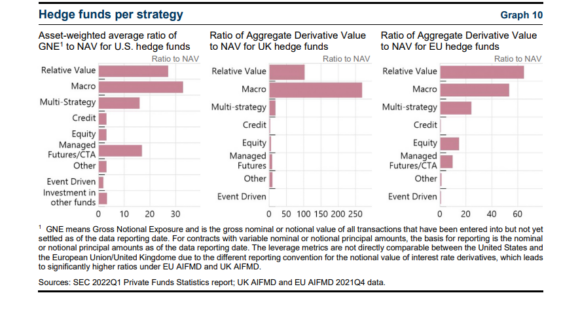Leverage is now very high in parts of the $7 trillion hedge fund sector, G20 risk watchdog Financial Stability Board (FSB) warned on Wednesday, while noting that significant data gaps make it hard to get a full picture of vulnerabilities among “non-banks.”
Many of the underlying flaws seen in non-bank financial institutions (NBFI) during the COVID-19 pandemic in March 2020 that forced central banks to inject liquidity into markets were still largely in place, the FSB said in a report.
“Limits on data collection and disclosure mean that certain aspects of NBFI leverage can be hidden,” the FSB said.
“While insurance companies, pension funds and investment funds represent two-thirds of NBFI assets, more than 90% of on balance sheet financial leverage is in so-called other financial intermediaries (OFIs), such as broker-dealers, hedge funds, finance companies, holding companies and securitisation vehicles,” the report said.
Some hedge funds, especially in the United States, Britain and European Union, use complex strategies that may embed vulnerabilities that are difficult for counterparties and regulators to assess quickly or unwind promptly, the FSB said.
“Within the hedge fund sector, there is a group of funds, typically pursuing macro and relative value strategies, with very high levels of synthetic leverage,” it said.
Future policy work could include assessing if more rules are needed for margin or cash that back derivatives and securities financing transactions which connect hedge funds with prime brokers, it said.

“One area to explore is whether prime brokers’ risk management of exposures to leveraged non-bank entities could be enhanced,” it said.
The main data gaps need addressing by improving the use of trade repositories used for recording transactions, enhancing reporting requirements for non-banks with high levels of leverage, and expanding disclosure requirements, the FSB said.
Increasing the availability and use of central clearing for government bond, cash and repurchase agreement, or repo, markets could also make markets more resilient to shocks, it said.
The FSB has already proposed tougher rules to make open-ended funds, a key part of the NBFI sector, more resilient in a market crisis but is facing heavy opposition from industry.
(Reporting by Huw Jones; editing by Tomasz Janowski)
Was this article valuable?
Here are more articles you may enjoy.



 Insurify Starts App With ChatGPT to Allow Consumers to Shop for Insurance
Insurify Starts App With ChatGPT to Allow Consumers to Shop for Insurance  Portugal Deadly Floods Force Evacuations, Collapse Main Highway
Portugal Deadly Floods Force Evacuations, Collapse Main Highway  Florida Insurance Costs 14.5% Lower Than Without Reforms, Report Finds
Florida Insurance Costs 14.5% Lower Than Without Reforms, Report Finds  Judge Awards Applied Systems Preliminary Injunction Against Comulate
Judge Awards Applied Systems Preliminary Injunction Against Comulate 

